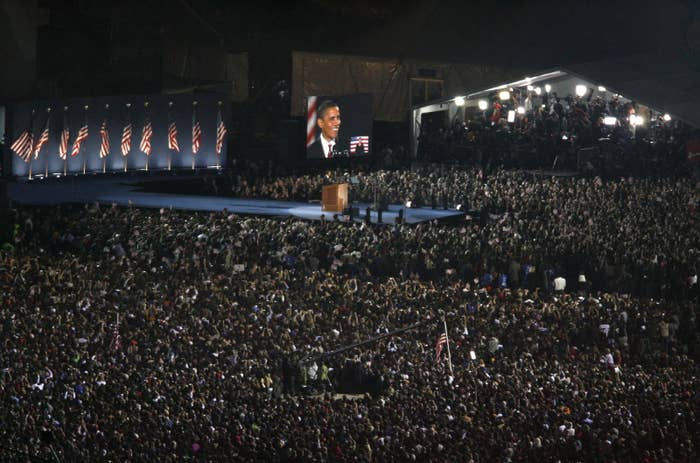
As we endured the first — and ideally last — midterm elections of the Trump presidency, it was understandable for some people to lose hope. But while the final days of this election cycle were marked by the vulgar downward spiral of Donald Trump’s immigration scaremongering, they also marked an important anniversary: Sunday was 10 years to the day since Barack Obama’s victory speech, delivered in Chicago’s Grant Park to a crowd of tens of thousands, and to hundreds of millions around the world.
Wrapping up a campaign of soaring rhetoric — the Iowa Caucus speech, New Hampshire, the Philadelphia speech on race, the convention acceptance speech in Denver — his speech in Grant Park was one of the finest he ever gave. It provided our nation a glimpse of what we could be, and what we can still be even today, despite Trump’s scorn and ire. And in these midterms, we were reminded again of how campaigns based on hope and optimism can show the way, thanks to a new crop of candidates with tremendous promise.
Florida’s Andrew Gillum, Georgia’s Stacey Abrams, and Texas’s Beto O’Rourke and MJ Hegar showed us how aspiration and inspiration can push back against fear and condemnation. In the spirit of Obama’s election a decade ago, these men and women — many groundbreakers in their own right — reminded us how quickly our politics can change from one extreme to another.
Obama, after all, was a little-known Illinois state senator when he delivered a memorable keynote address at the Democratic National Convention in Boston in 2004, during the height of the Bush administration. By November 2008, he was delivering his presidential victory speech.
On that night, the staff of then-New York governor David A. Paterson — the first African American governor in the history of the state — joined the Democratic victory party in a New York City hotel. My colleagues and I watched as network after network called Ohio, Pennsylvania, Florida, Michigan, and Wisconsin for Obama. At 11 p.m., they called California for the 47-year-old Illinois senator, and with that came the mathematical certainty that he would become our 44th president.
Not long after, he appeared on a stage on a cold fall evening and declared that “change has come to America.”
He talked about all the firsts that had taken place on that very day, including the lines of citizens that stretched around blocks to cast their votes. But he also talked about a woman named Ann Nixon Cooper, who was then 106 years old. Cooper stood out, he said, because she was an American who did not cast her vote lightly, due to her gender and because she was a person of color. “She was born just a generation past slavery, at a time when there were no cars on the road or planes in the sky,” he said.
He spoke about all the history Cooper had seen, including “bombs falling on our harbor” and “a boycott in Montgomery.” He could have offered a plain reference to the Rev. Martin Luther King Jr., but instead called King “a preacher from Atlanta” — a phrase still unbelievably powerful in its simplicity.
“A man touched down on the moon ...” the president-elect continued, “a wall came down in Berlin, a world was connected by our own science and imagination. And this year, in this election, she touched her finger to a screen and cast her vote…”
Obama asked if his daughters, then only 10 and 7, should live as long as Mrs. Cooper — if they should be around for the dawn of the next century — what progress will they witness?
In 2008, my wife and I were just beginning to discuss starting a family. Now, as the father of three, I can easily imagine my children (ages 8, 5, and 2) living until — and even past — the year 2100.
There is still time to make progress over the next 82 years, not only in science and innovation, but in reestablishing civility and societal norms under which we used to treat one another.
Obama’s campaign focused on hope and optimism, and on working toward a better tomorrow for America and the world. Channeling King’s eerily prescient speech in Memphis the night before his own assassination in 1968, the new president-elect said, “we may not get there in one year or even one term, but America ... I promise you — we as a people will get there…”
History could see the election of Donald Trump as a bump in the road. Hopefully, the behavior of some, witnessed by many, will be treated by generations to follow as an abnormality in the American story.
When I am feeling like we cannot possibly sink any lower, I find myself rewatching the election night speech of our last popularly elected president. It reminds me of what we promised ourselves we would be, while providing a glimmer of hope for the future that still remains possible.
Ross Wallenstein is a communications professional based in New York City. Previously, he served in the administration of former New York governors Eliot Spitzer and David A. Paterson and was an aide to former US representative Gary L. Ackerman.
